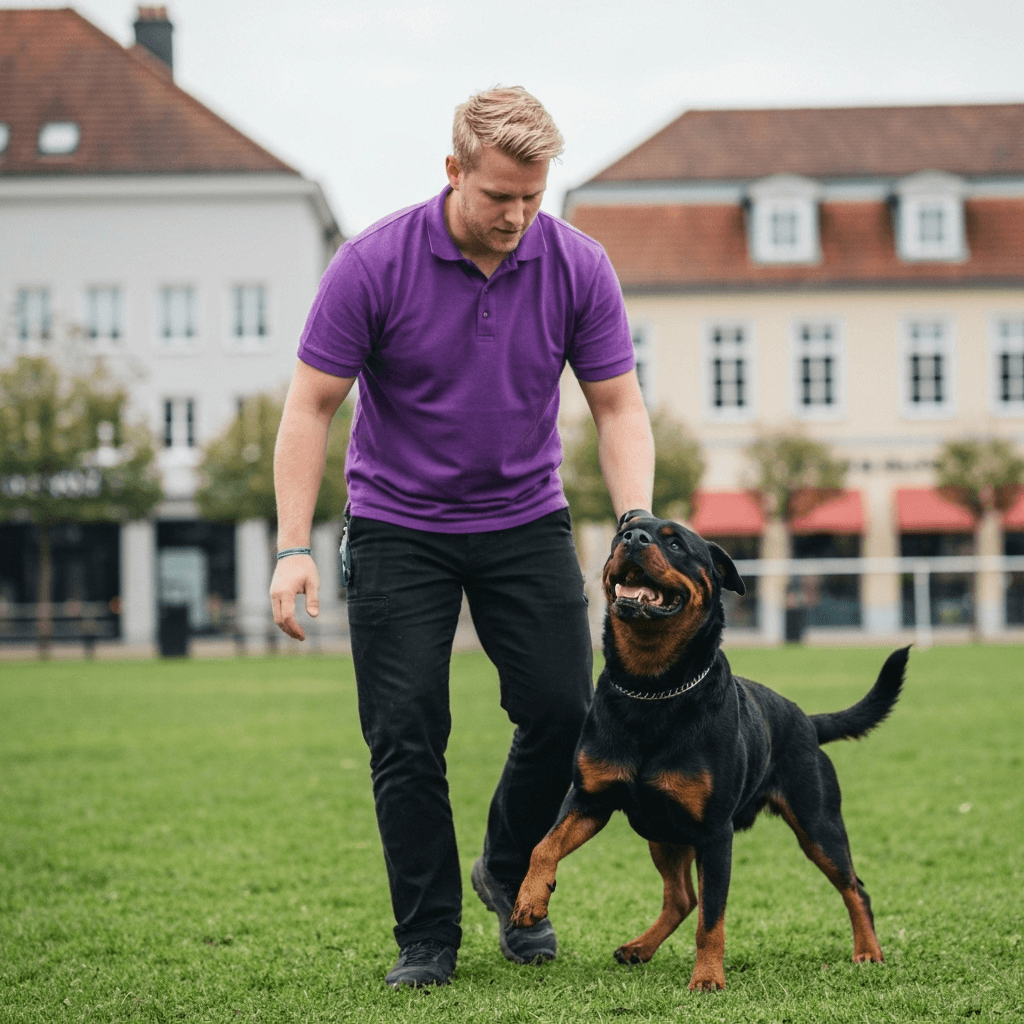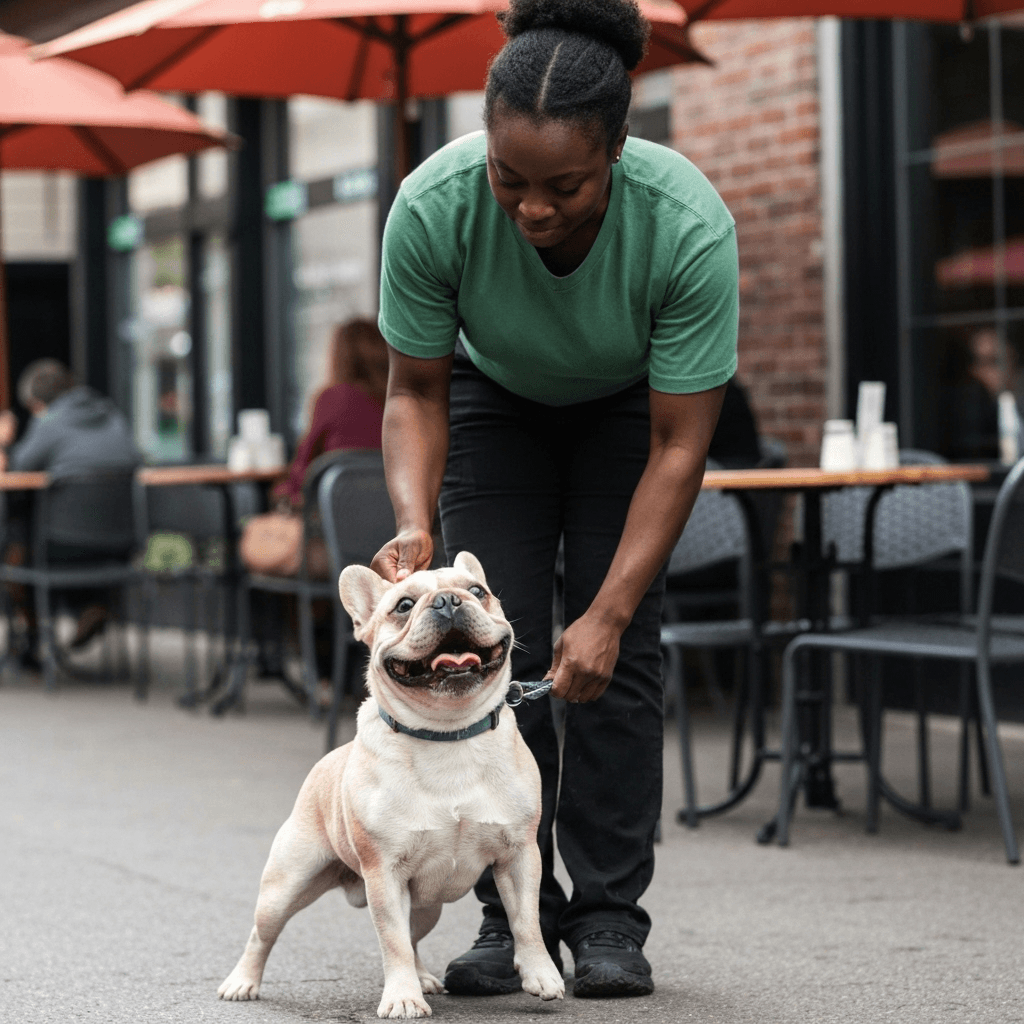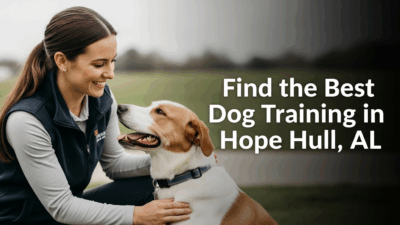Your Complete Guide to Choosing a Dog Trainer in Hope Hull
Finding the right dog trainer in Hope Hull means looking for someone who understands life in our quiet community. Your dog needs to walk calmly along our country roads, stay focused around the farms and livestock nearby, and come when called before you venture into busier areas of Montgomery.
The best training plans for Hope Hull dogs focus on real-world skills you’ll actually use. This means polite leash walking on our narrow lanes, friendly greetings at gates and driveways, and knowing when to settle down at home after a day outside.
How to Choose the Right Trainer
Start by looking for trainers who use positive reinforcement methods and can create goals that make sense for your daily routine. Whether you have acres of land or a smaller yard, your trainer should understand how your space affects your dog’s behavior.
Credentials help you sort through your options quickly. Good certifications to look for include KPA-CTP, CPDT-KA, and IAABC-CDBC for dogs with behavior problems. If your dog has serious issues like aggression or intense fear, advanced programs like CTC and CBCC-KA show deeper training knowledge.
In-home training works really well here in Hope Hull, especially for things like gate manners, getting comfortable around livestock, and stopping yard reactivity. Group classes in Montgomery can be great once your dog can pay attention around other dogs and distractions.
If your trainer wants to meet at public parks, make sure they have the right permits and insurance. Commercial training in city facilities often requires special permission.
Common Dog Training Methods Explained

Basic obedience covers the essentials like sit, down, stay, come when called, and good leash manners. These skills should work just as well in your driveway as they do on Montgomery’s busy sidewalks.
Puppy training focuses on the big early challenges like house training, getting comfortable in a crate, meeting new people and situations safely, leash training, and learning to handle vet visits without stress. Getting these right early saves you headaches later.
Behavior modification tackles tougher problems like separation anxiety, reactivity toward other dogs or people, guarding food or toys, and fear issues. Expect a careful, step-by-step plan that gradually helps your dog feel more confident.
Private lessons and in-home training let your trainer see exactly what happens in your space with your fencing, visitors, and neighboring dogs. Day training can speed things up when you’re short on time but need results quickly.
For dogs who need public access training, service dog preparation requires extra structure and rock-solid calm behavior in crowded Montgomery locations. This level of training takes serious commitment and the right trainer.
Stay away from trainers who use fear, pain, or intimidation to get results. Reward-based training is safer, clearer for your dog to understand, and much easier to keep up long-term.
Local Rules and Considerations in Hope Hull
Since Hope Hull is in Montgomery County, you’ll need to follow county animal rules along with Alabama state requirements. Understanding these basics helps you train responsibly and avoid problems.
Your dog needs to be on a leash in all public spaces unless you’re in a designated off-leash area. Keep a standard 6-foot leash handy for parks and sidewalks around town.
Alabama requires current rabies vaccination for all dogs, and your dog needs to wear the vaccination tag on their collar whenever they leave your property. This isn’t just good practice – it’s the law.
Excessive barking and dogs running loose can lead to nuisance complaints, especially near neighborhoods and churches. Good training helps you avoid these issues before they become legal problems.
Dog trainers aren’t licensed by the state of Alabama, so it’s up to you to choose carefully. Look for certified trainers when possible and always ask for proof of business insurance.
For county contacts and local ordinance details, check Montgomery County Animal Control. You can find Alabama vaccination requirements through the Alabama Department of Public Health. If you’re planning training sessions in state parks, review pet policies at Alabama State Parks.
Average Cost of Dog Training in Hope Hull (Updated for 2025)
Training prices around Hope Hull and Montgomery County depend on the trainer’s experience, how far they need to travel, and whether you meet at home or in public spaces. Here’s what local dog owners typically pay in 2025.
| Service Type | Average Cost (Hope Hull/Montgomery County) |
|---|---|
| Puppy classes (4–6 weeks) | $130–$240 total |
| Group obedience classes (4–6 weeks) | $140–$260 total |
| Private lessons at home (60–90 min) | $95–$165 per session |
| In-home training packages (4–6 visits) | $380–$780 total |
| Day training (trainer works with your dog + handoff) | $425–$850 per week |
| Initial behavior consultation for reactivity/anxiety | $130–$210 |
| Board and train programs (2–4 weeks) | $1,800–$3,600 total |
Expect extra travel fees if you live on a rural route, and higher rates for complex behavior problems or homes with multiple dogs. Make sure you get clear written goals, practice instructions, and a plan for measuring progress. Some trainers offer a short free consultation by phone or video to see if you’re a good fit.
Questions to Ask a Potential Dog Trainer
Before you commit to any trainer, get answers to these important questions:
- What training methods do you use, and how do you help dogs learn without using fear, pain, or intimidation?
- What certifications do you have, like CPDT-KA or KPA-CTP? Do you keep learning through programs like CPDT-KSA?
- How will you adapt training sessions to work with my Hope Hull property, fencing, and the livestock or farms nearby?
- Do you offer in-home visits, group classes, or day training, and which option fits my goals best?
- What exactly is included in your services, what will the total cost be, and are there extra travel fees for my location?
- Do you carry liability insurance and care, custody, and control coverage, and can you provide proof?
- How will we practice safely around other dogs and people before visiting busy parks in Montgomery?
- For serious reactivity or aggression issues, what’s your training plan and timeline, and will you work with my veterinarian if needed?
Local Hope Hull and Surrounding Area Resources for Dog Owners
Here are some great spots around Hope Hull where you can practice training with your dog:
Hannah Daye Ridling Bark Park in Montgomery has fenced areas separated for small and large dogs. It’s perfect for practicing recall during quieter times of day.
Cooter’s Pond Dog Park in Prattville offers popular fenced spaces with plenty of room for your dog to stretch out while you work on calm greetings with other dogs.
Blount Cultural Park’s walking paths in Montgomery provide a leashed, training-friendly environment where you can practice basic obedience and stays with mild distractions around.
Riverfront Park in Montgomery features on-leash urban paths that are ideal for working on loose-leash walking around bikes, strollers, and foot traffic.
The Town of Pike Road has trails and green spaces with open sight lines that make it easier to gradually work on distraction training.
Always check posted rules before you visit, bring plenty of water for you and your dog, and keep current vaccination records handy in case they’re requested.

Common Questions
How much does in-home dog training cost?
Most Hope Hull trainers charge between $95 and $165 per visit for in-home sessions. You can usually get package discounts when you book 4 to 6 sessions at once, though complex behavior issues may cost more.
Is in-home dog training worth it?
Absolutely. Working at your home lets your trainer address door manners, yard boundaries, reactions to livestock or neighboring dogs, and leash problems right where they actually happen instead of trying to recreate them somewhere else.
Can you pay someone to house train your dog?
Many trainers offer puppy programs or day training that includes house training schedules, crate training, and supervised play time. They’ll give you a clear plan to maintain the progress after training ends.
What is the 3-3-3 rule for dog training?
This rule suggests dogs need about 3 days to decompress in a new situation, 3 weeks to learn new routines, and 3 months to feel fully settled and confident. Good training plans respect this natural timeline instead of rushing results.
How long will it take to reach my training goals?
Most friendly dogs show solid improvement within 4 to 8 weeks when you practice daily. Dogs with reactivity or aggression issues usually need several months of careful behavior modification work to see lasting changes.
What should I bring to group classes?
Pack a flat collar or harness, a standard 6-foot leash, high-value treats your dog loves, water for both of you, and vaccination records if the trainer requests them. Leave retractable leashes at home since they can be dangerous in group settings.
What’s the leash law in Hope Hull?
Dogs must be on leash in all public areas except designated off-leash dog parks. Keep your dog under control with a standard leash and follow any posted rules at parks or trails.
Do I need a dog license in Hope Hull or Montgomery County?
Montgomery County doesn’t typically require separate dog licenses, but Alabama law does require current rabies vaccination and the vaccination tag on your dog’s collar when off your property. Check with Montgomery County Animal Control for any recent changes.
What shots does my dog need in Montgomery County?
Rabies vaccination is required throughout Alabama. Your veterinarian may also recommend core vaccines like distemper-parvo and bordetella based on your dog’s lifestyle and risk factors. See the state vaccination guidelines for current requirements.
Are dog trainers required to be licensed in Alabama?
Alabama doesn’t issue specific licenses for dog trainers, so they operate under normal business regulations. If a trainer boards dogs for board and train programs, ask about zoning compliance and insurance coverage, and request a written care plan.
Where can I practice off-leash recall?
Use fenced dog parks like Hannah Daye Ridling Bark Park or Cooter’s Pond Dog Park for safe off-leash practice. Start during less busy times to reduce distractions while your dog is still learning.
Which dog parks allow training around Hope Hull?
Both Hannah Daye Ridling Bark Park and Cooter’s Pond Dog Park allow off-leash play within their fenced areas. Just be respectful of posted rules and other park users who are there to play rather than train.
What beaches or trails allow dogs for training?
There aren’t any ocean beaches nearby, but many local and state parks allow leashed dogs on their trails. Check the pet policies for state parks through Alabama State Parks before planning your visit.
Do trainers need insurance to work in local parks?
Alabama law doesn’t require insurance for trainers, but many property owners and cities do require proof of liability coverage for commercial activities on their land. Ask to see a certificate of insurance before booking sessions in public spaces.
Can a trainer work on aggression cases in my neighborhood?
Yes, but you need a trainer with a solid plan and safety protocols in place. Look for advanced credentials like IAABC-CDBC or specialized programs like CTC, and make sure safety comes first before practicing around people or other dogs.
With the right combination of humane training methods, realistic goals, and practice around Hope Hull’s roads and nearby parks, good dog training can help your dog become the calm, well-behaved companion you want at home and around town.
